Bloat in dogs is one of the most dangerous and life-threatening conditions that can occur unexpectedly, especially in large, deep-chested breeds like the Golden Retriever. GDV, medically known as gastric dilatation volvulus, can cause your dog’s stomach to fill with air, twist, and cut off its blood supply. It might cause shock or even death if treatment is not provided.
Understanding what causes bloat in dogs is more than just a matter of curiosity; it can be life-threatening for your four-legged friend. It’s important for Golden Retriever owners to be aware of this condition. The breed’s playful energy, food addiction, and robust build make them more susceptible to bloat than many other dogs. The scary part: bloat can get worse within a few hours, or even faster. That’s why it’s important to understand the cycle of bloat in dogs so you can recognize it early and take emergency action.
In this blog, we’ll discuss the most common and hidden causes of bloat in golden retrievers, dispel some common myths, and explain how you can reduce the risk with proper lifestyle and grooming. While grooming your golden retriever and practicing good hygiene, such as using the right golden retriever shampoo, are important for their overall health, preventing bloat is not enough. Also, pay close attention to their eating habits, stress levels, and gut Health. We’ll take a closer look at the causes of this silent killer so you can be better prepared, take preventive measures, and keep your Golden Retriever healthy and safe.
Contents
- 1 What is Bloat in Dogs? Quick Facts for Golden Retriever Owners
- 2 What Causes Bloat in Dogs? Common Triggers You Should Know
- 3 Environmental and Emotional Factors That Trigger Bloat in Dogs
- 4 The Role of Gut Health in Bloat in Dogs
- 5 Can hygiene, climate, or hydration play a role in the Bloat?
- 6 Risk of Development: How Quickly Can Dogs Get Bloat?
- 7 Myths about What Causes Bloat in Dogs
- 8 Preventing the Causes of Bloat in Golden Retrievers
- 9 Final Thoughts: What Causes Bloat in Dogs – Save Your Golden Retriever
What is Bloat in Dogs? Quick Facts for Golden Retriever Owners
Bloat in dogs, also known as gastric dilatation, is a serious and potentially fatal condition that every Golden Retriever owner should be aware of. It occurs when a dog’s stomach quickly fills with gas, food, or liquid, expanding and putting pressure on nearby organs. In many cases, this can lead to gastric dilatation volvulus (GDV), a critical situation in which the stomach twists, cutting off its blood supply and, if left untreated, can lead to tissue death, shock, or even death within hours.
One of the most noticeable signs of bloat is a distended abdomen. Dogs may also pace, drool excessively, vomit without vomiting, or appear restless and anxious. With bloat in Golden Retrievers, these symptoms can appear suddenly and progress rapidly, even in healthy dogs. Therefore, it is important to understand the timeline of bloat in dogs. From the first signs to a serious medical emergency, the response time can be as short as 30-60 minutes.
Unfortunately, even dogs that appear perfectly healthy and well-groomed, including those that are regularly brushed with the best shampoo for golden retrievers, are not immune to bloat. This condition is not dependent on the shine of the coat or grooming; it is related to factors such as breed anatomy, diet, exercise, and stress. Bloat in golden retrievers remains one of the most misunderstood and under-recognized Health problems among large breeds. Understanding what it is, recognizing the early symptoms, and knowing how quickly the condition can worsen will help you better protect your dog and act quickly in an emergency.
What Causes Bloat in Dogs? Common Triggers You Should Know
Understanding what causes bloat in dogs is the first step to preventing this potentially fatal condition, especially in predisposed breeds like the Golden Retriever. While the exact cause is not always clear, veterinarians and researchers have identified several factors, from genetics to diet, that increase the risk of bloat. We’ll cover the most common triggers so you can make informed decisions and protect your four-legged friend from the dangers of bloat in Golden Retrievers.
Genetics and Breed Risks (Bloat in Golden Retrievers)
Some dogs are genetically predisposed to bloat due to their anatomy, and the Golden Retriever is one of them. Bloat is more common in large, deep-chested breeds, and the Golden Retriever fits this profile perfectly. The deep chest gives the stomach more room to twist or evert, which increases the risk of gastric dilatation volvulus (GDV).
Research also shows that the risk is significantly higher if a close relative (parent or sibling) of the Golden Retriever has GDV. Due to this hereditary trait, it is important for owners to know their dog’s family history and pay attention to their daily habits and diet. Even if your Golden Retriever appears healthy and is regularly brushed with a shampoo suitable for Golden Retrievers, this does not protect them from the internal risk factors that contribute to GDV. Genetics play a major role and should never be ignored.
Eating and Drinking Habits That Can Cause Bloat in Dogs
Eating habits are one of the most controllable factors when it comes to the what causes bloat in dogs. Dogs that eat too quickly are at a much higher risk because they swallow excess air along with their food, which leads to bloat. Golden retrievers, with their large appetites and love of food, often fall into this category.
It used to be that feeding a golden retriever from tall bowls would aid digestion. However, research shows that this can increase the risk of bloat. The same is true if a dog drinks a lot of water quickly, especially right after exercise or a meal – this can lead to bloat, another serious problem. To reduce the risk of bloat in a golden retriever, introduce them to bowls gradually and control access to water before and after feeding. These small changes can make a big difference in your dog’s safety.
Food Type and Feeding Frequency
Food type and feeding frequency can also affect the what causes bloat in dogs. There is some evidence that dry food, especially those high in fat or hard-to-digest fillers, may contribute to excessive gas. On the other hand, raw or homemade food may be more digestible for some dogs, but every Golden Retriever is different.
One large meal a day is also a risk factor. Instead, split the meal into two or three smaller portions to reduce the strain on the stomach. Large meals distend the stomach and can lead to gas bloat. By adjusting your dog’s diet, feeding schedule, and grooming (be sure to use the best Golden Retriever shampoo to keep them looking and feeling their best), you can reduce the risk of gastric bloat in Golden Retrievers and improve digestion.
Environmental and Emotional Factors That Trigger Bloat in Dogs
While genetics and diet play a major role, emotional and environmental factors also play a crucial role in bloat in dogs, especially in energetic and outgoing breeds like the Golden Retriever. These factors are often overlooked, but they can significantly impact your dog’s digestion and increase the overall risk of developing bloat.
Dogs are sensitive animals, and Golden Retrievers in particular are known for their affectionate and people-oriented nature. They enjoy routine, human interaction, and a calm environment. Disrupting this balance — whether through loud noises, prolonged solitude, or movement — can lead to emotional stress that has a physical impact on the body. Changes in bowel habits and breathing caused by stress can lead to bloating and increased intra-abdominal pressure, making Golden Retrievers more prone to bloat.
Stress, Anxiety, and Sudden Activity After Eating
One of the lesser-known but common causes of what causes bloat in dogs is a combination of stress and sudden physical activity after eating. If a dog eats and immediately starts running, jumping, or playing, the risk of bloat increases because the stomach may not have fully settled. This is especially true for Golden Retrievers, who are naturally playful and often excited after eating.
Anxious behaviors such as pacing, whining, or nervous panting also cause more air to enter the stomach and increase the risk of bloat. Dogs that suffer from separation anxiety or are often exposed to chaos may be more prone to these issues. To prevent bloat in golden retrievers, it is important to manage physical and emotional stress. By providing quiet feedings, limiting activity for at least 30 to 60 minutes after meals, and creating a calm environment in the home, you can help reduce what causes bloat in dogs outside the food bowl.
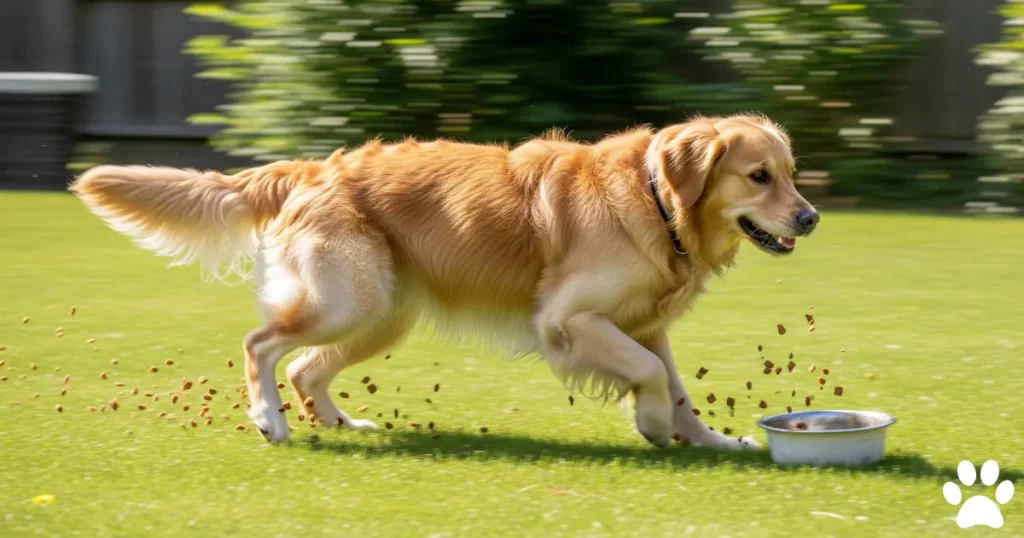
The Role of Gut Health in Bloat in Dogs
Gut health is an important, but often overlooked, factor when looking at what causes of bloat in dogs, especially in breeds like the Golden Retriever. A balanced digestive system not only helps with nutrient absorption and immune health, but it also regulates gas production, which is an important factor in preventing gas.
An imbalance of gut bacteria, known as dysbiosis, can lead to excessive fermentation of food, which can lead to bloat in the stomach. If these gases build up too quickly and are not eliminated through normal digestion or burping, they can cause dangerous bloat. When combined with stress or physical activity, this condition can quickly lead to bloat in Golden Retrievers or even gastrointestinal sclerosis in dogs. Both of these conditions require emergency care. A consistent, high-quality diet rich in fiber and beneficial bacteria can promote gut health. Probiotics and prebiotics—in the form of gut-healthy supplements or foods—can improve microbial balance, reduce inflammation, and lower the risk of bloat.
Golden Retrievers are prone to certain health issues, including sensitive stomachs, food intolerances, and stress-related digestive issues. All of these issues can disrupt their gut health and increase the risk of bloat. Grooming, such as using the right Golden Retriever shampoo, helps maintain a healthy coat, but good digestion is just as important. Taking care of your Golden Retriever’s gut health will help strengthen their immune system and help minimize one of the main causes of bloat in dogs.
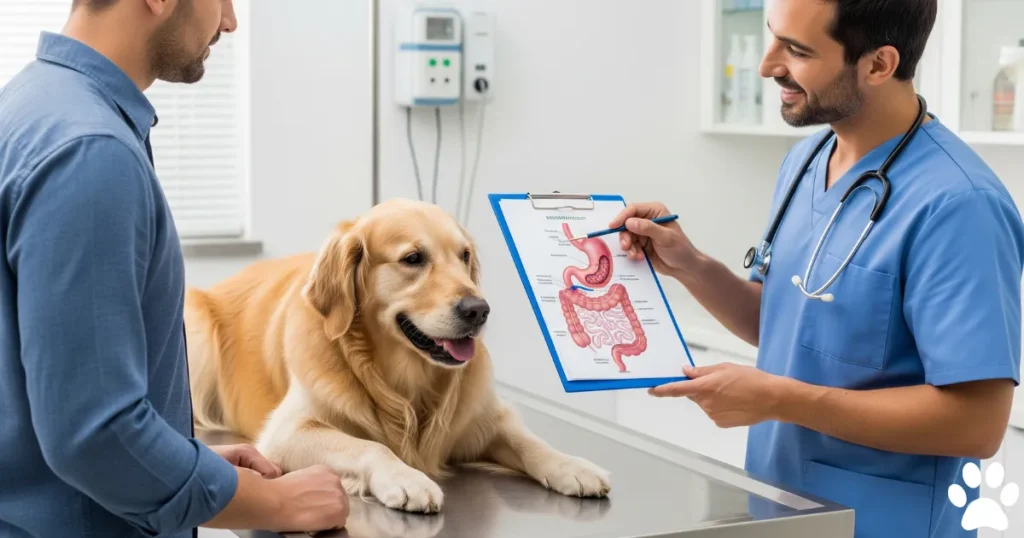
Can hygiene, climate, or hydration play a role in the Bloat?
When researching what causes bloat in dogs, it’s easy to come across common myths, especially around grooming, weather conditions, and hydration. While these factors aren’t the main ones, when combined with other factors, they can increase your dog’s overall risk, especially in breeds like the Golden Retriever.
We’re debunking one myth: too much bathing or using certain shampoos doesn’t cause bloat. You can pamper your dog with the best Golden Retriever shampoo to keep their coat shiny and soft — it’s good for their skin and hygiene. But even the best brushing won’t prevent bloat. It’s caused by internal factors like abdominal pressure, bloating, and exercise, not external hygiene. On the other hand, hydration certainly plays a role. Dogs that drink large amounts of water at once, especially after exercise or a meal, may develop Water Bloat, a rare but dangerous condition in which the stomach quickly fills and expands. Golden retrievers, known for their enthusiasm (including for water), may drink too quickly if left unattended.
Temperature fluctuations, especially cold snaps, can also affect digestion. Cold environments can slow down the digestion process and increase the risk of bloat after a large meal or intense exercise. It is best to feed and exercise your golden retriever on a consistent seasonal schedule. While hygiene, hydration, and weather are not direct causes, they do play a role in the overall picture of what causes bloat in dogs and should not be ignored.
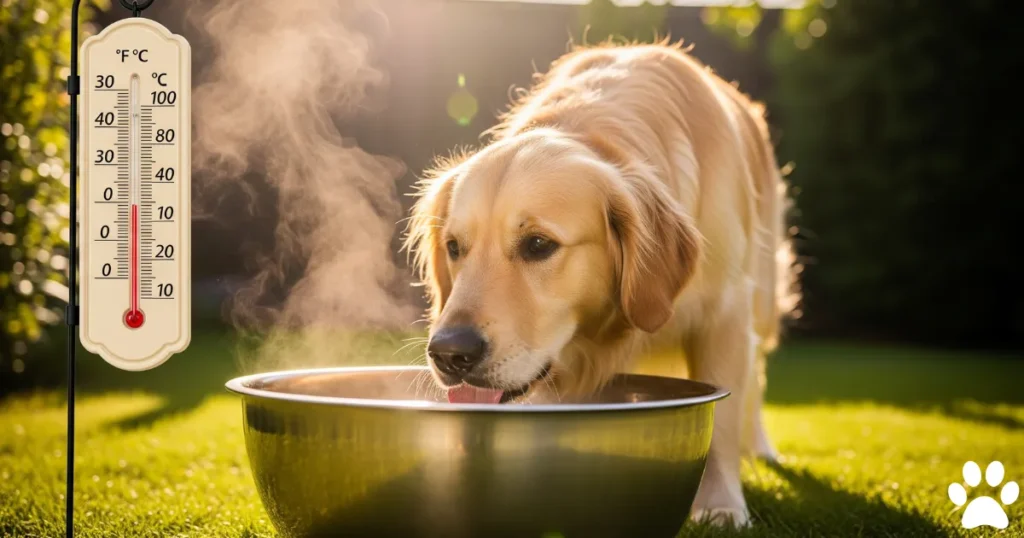
Risk of Development: How Quickly Can Dogs Get Bloat?
One of the most dangerous aspects of dog bloat is not only what triggers it, but how quickly it gets worse. Once bloat has occurred, time is your worst enemy. From the time symptoms appear, you may have anywhere from 30 minutes to 6 hours to get your Golden Retriever to the vet before the condition becomes fatal.
The early stages may include pacing, non-productive vomiting, drooling, restlessness, and bloating. These symptoms may seem minor at first, so many owners put off treatment, often with disastrous consequences. That’s why we highly recommend reading our guide, “The Course of Bloat in Dogs,” which outlines each stage and how to respond quickly. In puppies, the condition can get worse even faster. Signs of bloat in puppies, such as whining, discomfort after eating, and sudden bloating, should be treated with the same urgency. Although bloat is less common in young dogs, it can occur in puppies, especially those who are fast eaters or restless.
Golden retrievers are particularly susceptible to this condition due to their chest structure, playful behavior, and tendency to gulp down their food. Even if your dog is healthy and well-groomed — regularly bathed with the best golden retriever shampoo and eating a proper diet — they are not immune to bloat. In short, it is important to understand the cause of bloat in dogs, but it is even more important to act quickly when symptoms appear. Recognize the symptoms, know how long the bloat has been going on, and contact your veterinarian immediately. It could save your golden retriever’s life.
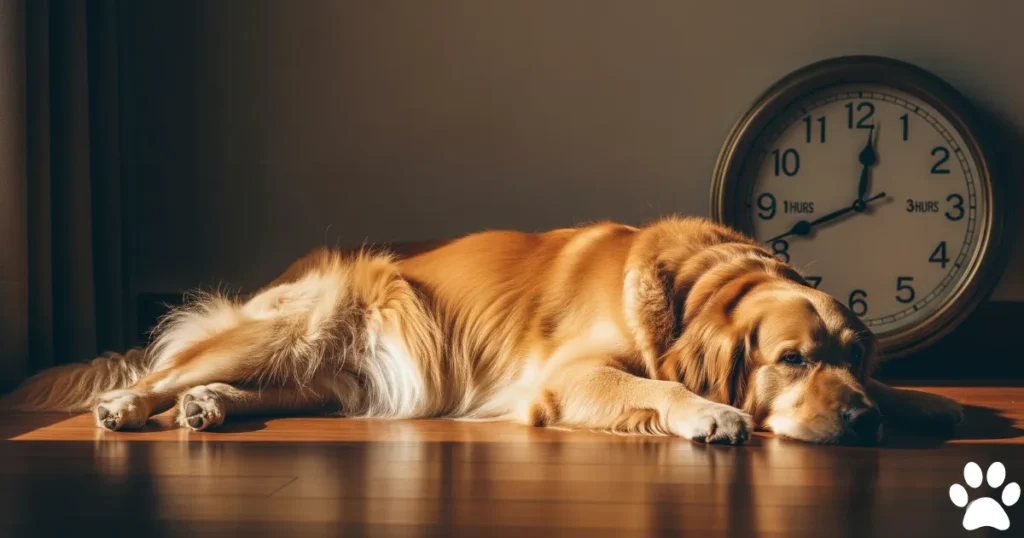
Myths about What Causes Bloat in Dogs
There are many misconceptions about what causes bloat in dogs, especially among conscientious owners who want to help. It’s important to dispel these misconceptions to avoid making dangerous mistakes, especially in at-risk breeds like the Golden Retriever.
One of the most common myths is that tall food bowls Prevent Bloat. While this advice was once widely accepted, recent research shows the opposite: tall food bowls can actually increase the risk of bloat, especially in large, deep-chested dogs. Feeding your Golden Retriever from the floor or a low platform is currently considered the safest option, unless your veterinarian recommends otherwise.
Another misconception is that poor grooming or hygiene can cause bloat. In fact, bloat is an emergency, not a result of your dog being dirty or clean. While a well-groomed coat can improve your dog’s appearance and well-being, and using the right Golden Retriever shampoo is good for skin and coat health, it won’t prevent stomach problems like bloat. Knowing the facts about what causes bloat in dogs will allow you to focus on the real risks, like diet, exercise regimen, stress, and gut health, rather than outdated or irrelevant methods. By avoiding these myths, you can better protect the life and well-being of your Golden Retriever.
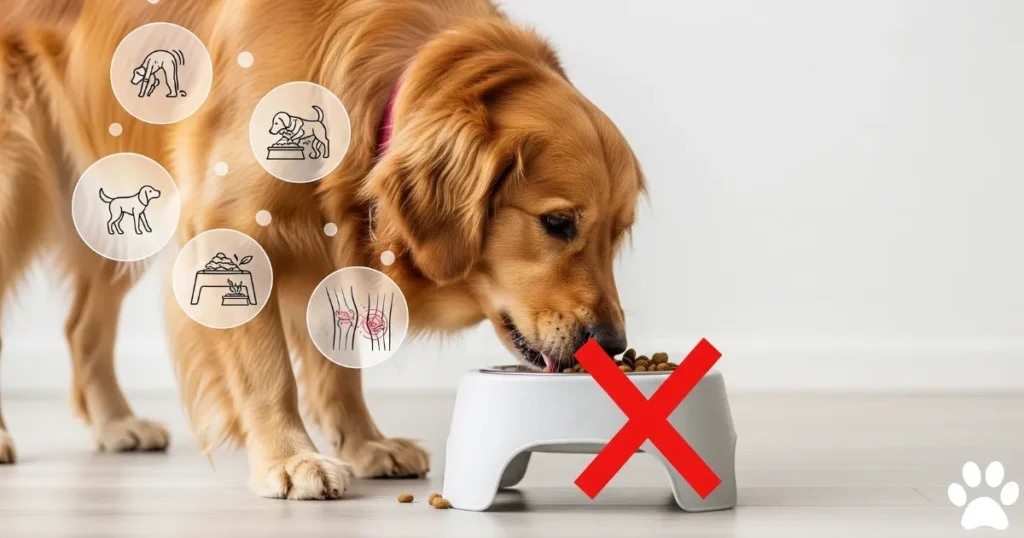
Preventing the Causes of Bloat in Golden Retrievers
Now that we’ve covered what causes bloat in dogs, the next step is prevention, especially in breeds like the Golden Retriever that are more prone to this serious condition. While not all cases of the condition can be prevented, many of the underlying risk factors can be controlled with proper care and attention.
The best approach starts with simple daily habits. Proper spacing of meals is crucial – don’t feed your dog one large meal a day. Instead, divide it into two or three smaller meals. This lessens the possibility of bloating and feeling stuffed, as well as the strain on the stomach. Feeding slowly from bowls also helps prevent rapid gobbling of food – one of the main causes of bloat in Golden Retrievers. Another important factor is emotional stress. Keep the area quiet and calm during feeding time, and avoid vigorous exercise or play for at least 30 to 60 minutes after eating. This will give your Golden Retriever’s digestive system time to stabilize and function properly.
You should also keep an eye on hydration: don’t let your dog drink too much water at once, especially after exercise. While your pup can be given a good brushing and pampered with the best Golden Retriever shampoo, this alone won’t be enough to protect against internal problems like bloat. Routine veterinary checkups can also play an important role in prevention. Your veterinarian can help evaluate genetic risk factors and recommend preventative measures like gastropexy for at-risk dogs.
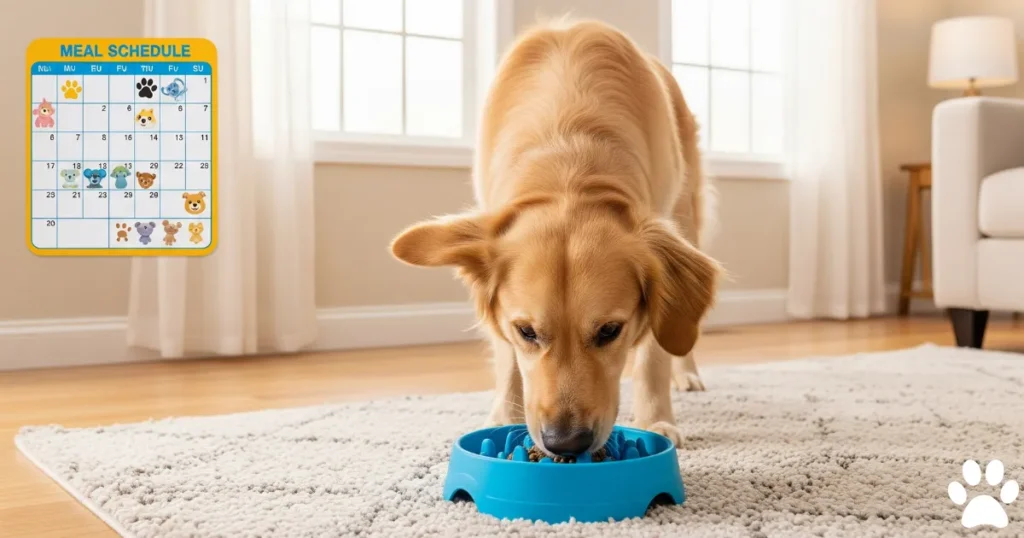
Final Thoughts: What Causes Bloat in Dogs – Save Your Golden Retriever
Now that you know what causes bloat in dogs, you can better protect your Golden Retriever from this silent but deadly condition. Bloat can be caused by a variety of things: genetics, eating too much too quickly, poor nutrition, stress, intense exercise after eating, and even intestinal problems. Some risks are unavoidable, but many can be reduced with a targeted daily routine and a preventative approach to your dog’s health.
Bloat in golden retrievers can progress quickly and be fatal within hours, so prevention and early detection are essential. Pay attention to your dog’s eating habits, avoid exercise after meals, provide a calm environment, and support gut health with a balanced diet and, if necessary, probiotics. While grooming is important for overall well-being, as is choosing the right shampoo for golden retrievers, it’s especially important when it comes to bloat. Don’t wait for symptoms to appear. Take action now to reduce risk factors and stay informed. For more tips on preventing bloat in dogs and other golden retriever health issues, check out our guide. A few small changes today could save your golden retriever’s life tomorrow.
Dr. Nabeel A.
Hi, I’m Dr. Nabeel Akram – a farm management professional by trade and a passionate Golden Retriever enthusiast at heart. With years of experience in animal science and livestock care, I’ve built a career around understanding animals—how they live, thrive, and bring value to our lives. This blog is a personal project born from that same passion, focusing on one of the most loyal and lovable breeds out there: the Golden Retriever. Whether I’m managing farm operations or sharing insights on canine health, behavior, and care, it all ties back to one core belief—animals deserve thoughtful, informed, and compassionate attention. Welcome to a space where professional expertise meets genuine love for dogs.
Facebook |
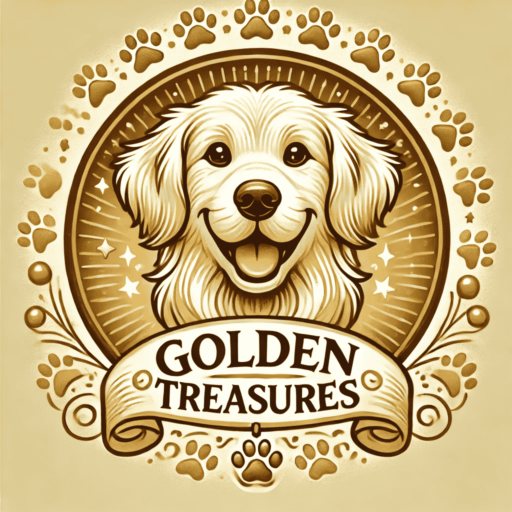

Links will be automatically removed from comments.